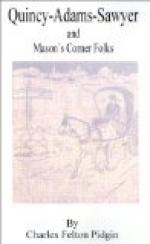He then sat down in his favorite armchair and began thinking out the details of his aggressive campaign against the singing-master. He had disposed of his enemy in half a dozen pitched battles, when the sound of the piano fell upon his ear.
She was playing. He hoped she was a good musician, for his taste in that art was critical. He had studied the best, and he knew it when he heard it sung or played. The piano was a good one, its tone was full and melodious, and it was in perfect tone.
He listened intently. He looked and saw that he had unintentionally left the door of his room ajar. The parlor door, too, must be open partly, or he could not have heard so plainly. What was that she was playing? Ah! Mendelssohn. Those “Songs Without Words” were as familiar to him as the alphabet. Now it is Beethoven, that beautiful work, “The Moonlight Sonata,” she was evidently trying to recall her favorites to mind, for of course she could not be playing by note. Then she strayed into a “valse” by Chopin, and followed it with a dashing galop by some unknown composer. “She is a classical musician,” said Quincy to himself, as the first bars of a Rhapsodic Hongroise by Liszt fell upon his ear. “I hope she knows some of the old English ballads and the best of the popular songs,” thought Quincy.
As if in answer to his wish she played that sterling old song, “Tis but a Little Faded Flower,” and Quincy listened with pleasure to the pure, sweet, soprano voice that rang out full and strong and seemed to reach and permeate every nook and corner in the old homestead.
Quincy could stand it no longer. He stepped quietly to his door, opened it wide, and listened with delight to the closing lines of the song.
Then she sang that song that thrilled the hearts of thousands of English soldiers in the Crimea on the eve of the battle of Inkermann, “Annie Laurie,” and it was with difficulty that Quincy refrained from joining in the chorus. Surely Annie Laurie could have been no purer, no sweeter, no more beautiful, than Alice Pettengill; and Quincy felt that he could do and die for the girl who was singing in the parlor, as truly as would have the discarded suitor who wrote the immortal song.
But Quincy was destined to be still more astonished. Alice played a short prelude that seemed familiar to him, and then her voice rang out the words of that beautiful duet that Quincy had sung with Lindy Putnam at the singing-master’s concert. Yes, it was Jewell’s “Over the Bridge.” This was too much for Quincy. He went quietly down the stairs and looked in at the parlor door, which was wide open. Alice was seated at the piano, and again the sun, in its westward downward course, shone in at the window, and lighted up her crown of golden hair. This time she had reversed the colors which she evidently knew became her so well, and wore a dress of light pink, while a light blue knitted shawl, similar to its pink companion, lay upon the chair beside her.




